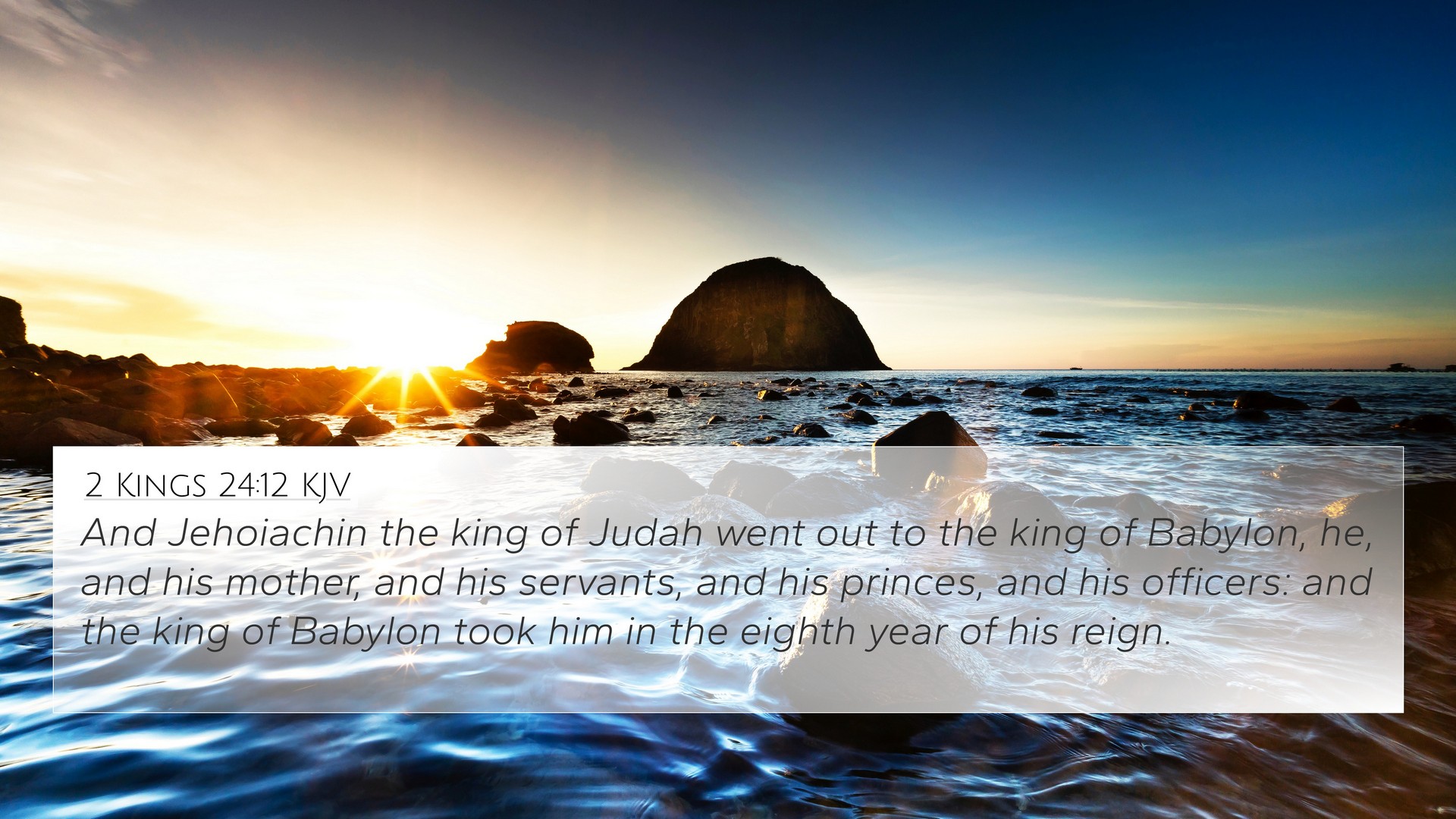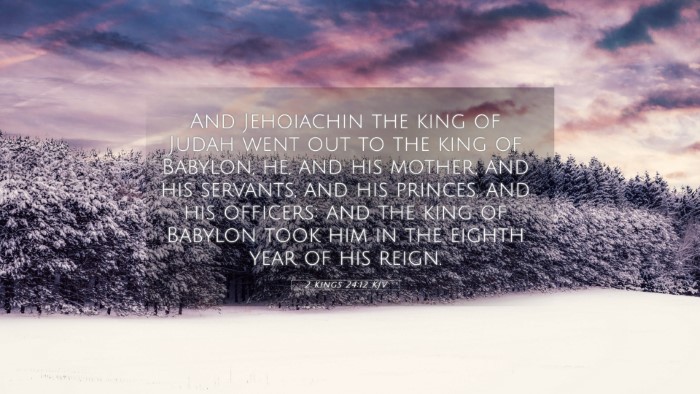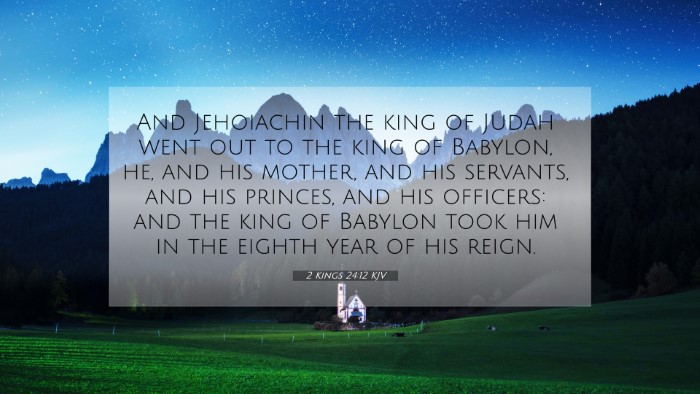Old Testament
Genesis Exodus Leviticus Numbers Deuteronomy Joshua Judges Ruth 1 Samuel 2 Samuel 1 Kings 2 Kings 1 Chronicles 2 Chronicles Ezra Nehemiah Esther Job Psalms Proverbs Ecclesiastes Song of Solomon Isaiah Jeremiah Lamentations Ezekiel Daniel Hosea Joel Amos Obadiah Jonah Micah Nahum Habakkuk Zephaniah Haggai Zechariah Malachi2 Kings 24:12 Similar Verses
2 Kings 24:12 Cross References
And Jehoiachin the king of Judah went out to the king of Babylon, he, and his mother, and his servants, and his princes, and his officers: and the king of Babylon took him in the eighth year of his reign.
Uncover the Rich Themes and Topics of This Bible Verse
Listed below are the Bible themes associated with 2 Kings 24:12. We invite you to explore each theme to gain deeper insights into the Scriptures.
2 Kings 24:12 Cross Reference Verses
This section features a detailed cross-reference designed to enrich your understanding of the Scriptures. Below, you will find carefully selected verses that echo the themes and teachings related to 2 Kings 24:12 KJV. Click on any image to explore detailed analyses of related Bible verses and uncover deeper theological insights.

Jeremiah 24:1 (KJV) »
The LORD shewed me, and, behold, two baskets of figs were set before the temple of the LORD, after that Nebuchadrezzar king of Babylon had carried away captive Jeconiah the son of Jehoiakim king of Judah, and the princes of Judah, with the carpenters and smiths, from Jerusalem, and had brought them to Babylon.

Jeremiah 52:28 (KJV) »
This is the people whom Nebuchadrezzar carried away captive: in the seventh year three thousand Jews and three and twenty:
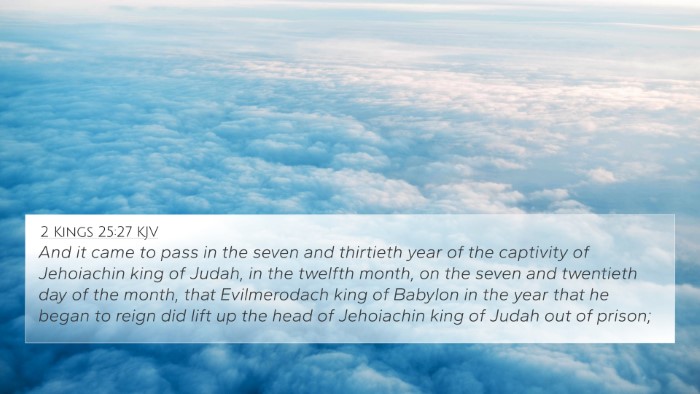
2 Kings 25:27 (KJV) »
And it came to pass in the seven and thirtieth year of the captivity of Jehoiachin king of Judah, in the twelfth month, on the seven and twentieth day of the month, that Evilmerodach king of Babylon in the year that he began to reign did lift up the head of Jehoiachin king of Judah out of prison;
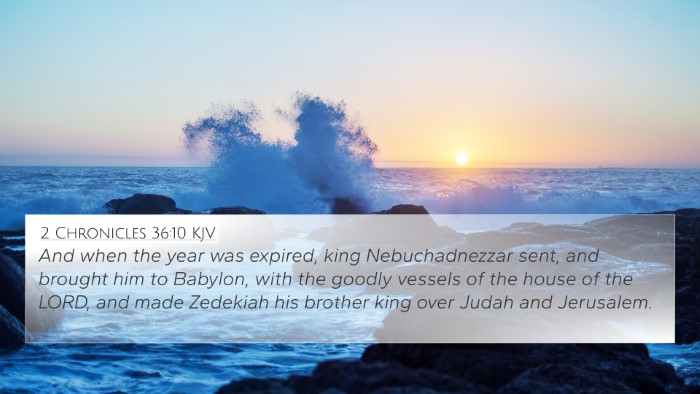
2 Chronicles 36:10 (KJV) »
And when the year was expired, king Nebuchadnezzar sent, and brought him to Babylon, with the goodly vessels of the house of the LORD, and made Zedekiah his brother king over Judah and Jerusalem.
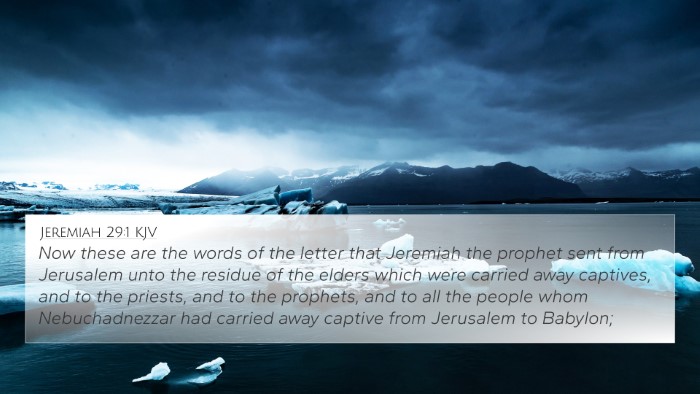
Jeremiah 29:1 (KJV) »
Now these are the words of the letter that Jeremiah the prophet sent from Jerusalem unto the residue of the elders which were carried away captives, and to the priests, and to the prophets, and to all the people whom Nebuchadnezzar had carried away captive from Jerusalem to Babylon;
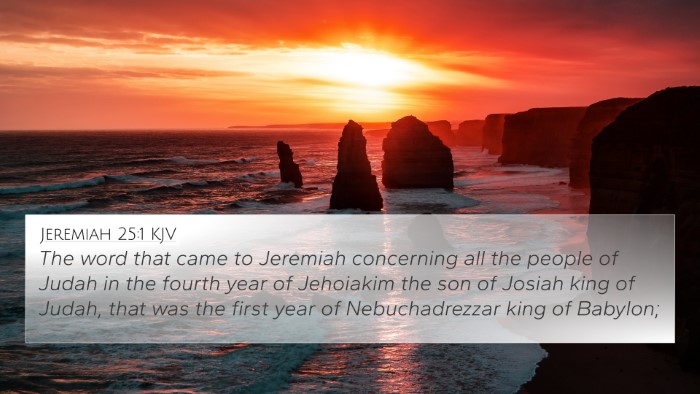
Jeremiah 25:1 (KJV) »
The word that came to Jeremiah concerning all the people of Judah in the fourth year of Jehoiakim the son of Josiah king of Judah, that was the first year of Nebuchadrezzar king of Babylon;
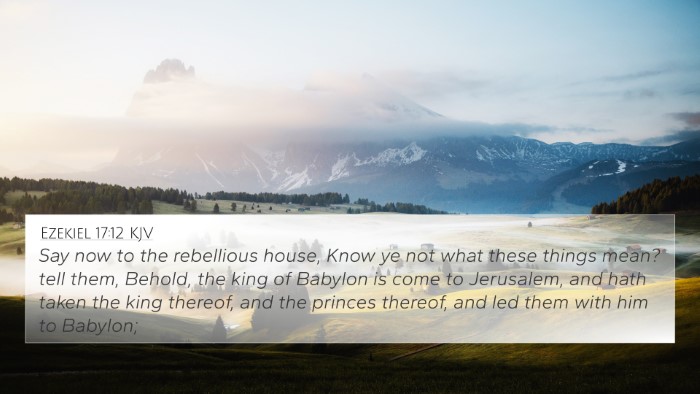
Ezekiel 17:12 (KJV) »
Say now to the rebellious house, Know ye not what these things mean? tell them, Behold, the king of Babylon is come to Jerusalem, and hath taken the king thereof, and the princes thereof, and led them with him to Babylon;
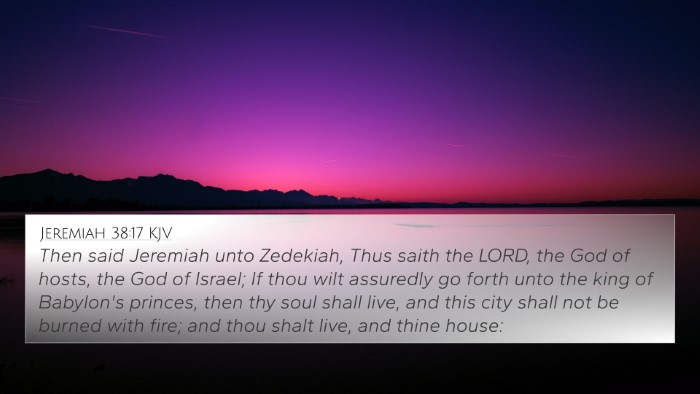
Jeremiah 38:17 (KJV) »
Then said Jeremiah unto Zedekiah, Thus saith the LORD, the God of hosts, the God of Israel; If thou wilt assuredly go forth unto the king of Babylon's princes, then thy soul shall live, and this city shall not be burned with fire; and thou shalt live, and thine house:
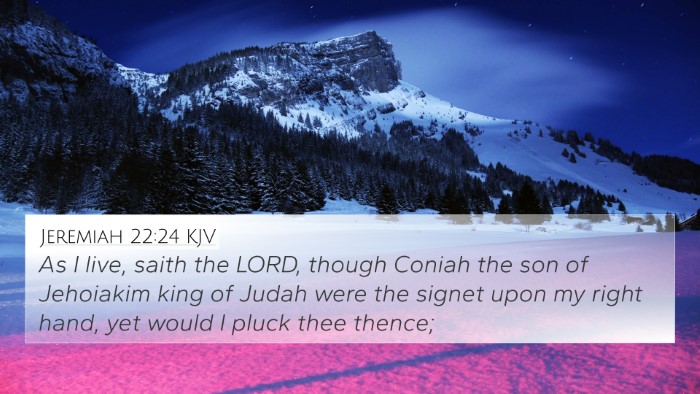
Jeremiah 22:24 (KJV) »
As I live, saith the LORD, though Coniah the son of Jehoiakim king of Judah were the signet upon my right hand, yet would I pluck thee thence;
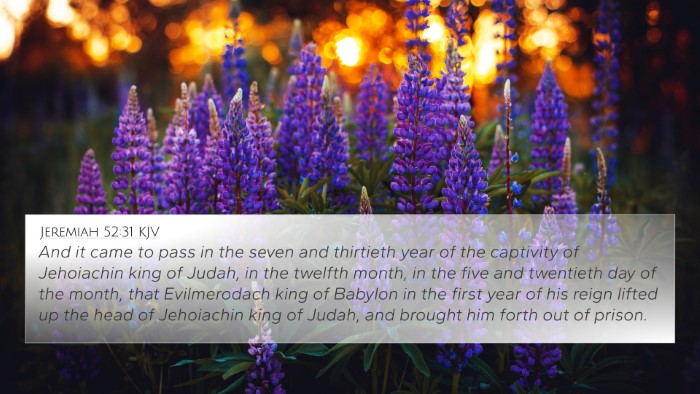
Jeremiah 52:31 (KJV) »
And it came to pass in the seven and thirtieth year of the captivity of Jehoiachin king of Judah, in the twelfth month, in the five and twentieth day of the month, that Evilmerodach king of Babylon in the first year of his reign lifted up the head of Jehoiachin king of Judah, and brought him forth out of prison.
2 Kings 24:12 Verse Analysis and Similar Verses
Understanding 2 Kings 24:12
Bible Verse: 2 Kings 24:12
"And Jehoiachin the king of Judah went out to the king of Babylon, he, and his mother, and his servants, and his princes, and his officers: and the king of Babylon took him in the eighth year of his reign."
Summary of Meaning
This verse marks a significant turning point in the history of Judah. Jehoiachin, the king of Judah, surrenders to Nebuchadnezzar, the king of Babylon, highlighting the transition of power and the consequences of Israel's unfaithfulness. The act of surrender illustrates the dire straits of Judah, leading to a new chapter dominated by Babylonian influence.
Insights from Public Domain Commentaries
-
Matthew Henry:
Henry emphasizes the tragic state of Israel as it succumbs to Babylonian control. He notes that Jehoiachin's decision to yield, along with his mother and the royal court, underscores the desperation faced by the nation due to its idolatry and disobedience to God.
-
Albert Barnes:
Barnes highlights the political implications of this event. He notes that the capture of Jehoiachin signifies not only the fall of Jerusalem but also the fulfilment of prophetic warnings about Judah's impending doom due to their continuous rebellion against God's commands. It serves as a reminder of God's unwavering judgment.
-
Adam Clarke:
Clarke provides context about the Babylonian siege, explaining the ramifications of Jehoiachin's capture for the nation of Judah, marking the beginning of the exile. He also points out that Jehoiachin's cooperation with Nebuchadnezzar reflects a collapse of leadership and faith among the people.
Comparative Bible Verse Analysis
This verse can connect with other Scriptures providing a broader understanding of its implications:
- Jeremiah 22:24-30: Prophecy concerning Jehoiachin's lineage and its ultimate downfall.
- Ezekiel 12:10: Reiterates the fate anticipated for Jehoiachin and the elders of Israel.
- 2 Chronicles 36:9-10: Parallels the story of Jehoiachin's capture and subsequent activities.
- Isaiah 39:6-7: Foretold the coming Babylonian influence, implying a bigger picture of divine prophecy.
- Daniel 1:1-3: Illustrates the extent of Nebuchadnezzar's conquest and the beginning of the exile process.
- Lamentations 2:9: Speaks to the despair and ruin faced by Jerusalem, reflecting the emotional and spiritual fallout from these events.
- Matthew 1:12: Jehoiachin's legacy continues in the genealogy of Christ, demonstrating God’s sovereignty even through adversity.
Thematic Bible Verse Connections
Not only does 2 Kings 24:12 illustrate themes of surrender and judgment but it also connects to broader Biblical themes through the following:
- Faithfulness vs. Apostasy: The narrative showcases the consequences of turning away from God, a recurring theme throughout scriptures.
- God’s Sovereignty: It reflects God's authority over nations, fulfilling prophetic declarations through actual historical events.
- Exile and Restoration: This event marks the start of exile for Judah, a theme explored throughout the prophetic literature, leading to eventual hope and restoration.
How to Use Bible Cross-References
Cross-referencing in studies can illuminate connections between Scriptures. To understand 2 Kings 24:12 better, consider:
- Identifying phrases or themes shared in multiple books.
- Utilizing a Bible concordance to discover synonyms or related terms that appear in the texts.
- Using tools for Bible cross-referencing to draw parallels and deepen understanding.
- Employing a cross-reference guide during Bible studies to link verses and form cohesive insights into the texts.
User-Intent Keywords Related to 2 Kings 24:12
For readers seeking deeper understanding, here are common inquiries related to this verse:
- What verses are related to 2 Kings 24:12?
- Find cross-references for 2 Kings 24:12.
- How do 2 Kings 24:12 and Jeremiah 22:24 connect?
- Similarities between 2 Kings 24:12 and Ezekiel 12:10.
- Bible verses that support the concepts presented in 2 Kings 24:12.
Conclusion
Understanding 2 Kings 24:12 requires careful consideration of the historical context and its theological implications. The surrender of Jehoiachin serves as a profound example of the consequences of disobedience to God. Through comparative scripture analyses and thematic connections, one can glean a deeper understanding of God’s dealings with His people, the patterns of sin and judgment, and the hope of restoration that follows.
